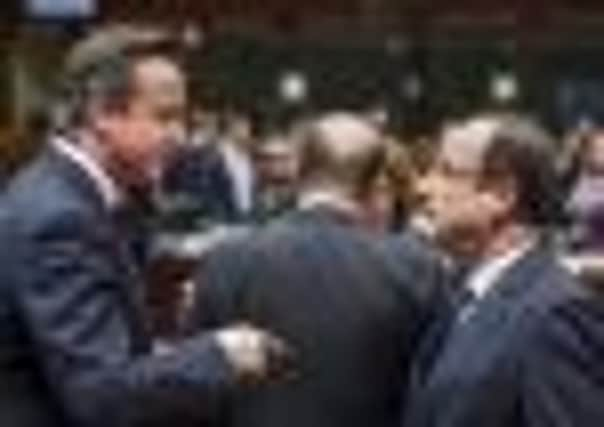Britain and France seeking re-think on Syrian arms


David Cameron and French president Francois Hollande made a joint pitch at an EU summit in Brussels, insisting the Opposition could need “lethal” military support currently outlawed by the EU’s own sanctions against the regime of dictator Bashar Assad.
But German chancellor Angela Merkel - and EU foreign policy chief Cathy Ashton - raised concerns that attempting to tip the military odds in favour of the rebels could backfire.
Advertisement
Hide AdAdvertisement
Hide AdEmerging from a Brussels summit originally called to discuss the economic crisis, Mr Cameron said: “It is worth reflecting that we are two years into this dreadful conflict. There are probably over 70,000 people who have lost their lives.
“We have to be frank that what the international community has done so far, of course, has helped in terms of humanitarian assistance... but it hasn’t overall worked in terms of stopping this conflict and achieving transition in Syria.”
EU foreign ministers recently renewed the current arms embargo until the end of May, extending it to allow “non-lethal” assistance tothe Syrian opposition through equipment such as armoured vehicles.
But London and Paris are pressing to end the embargo altogether to pave the way for arming the rebels if necessary.
The problem is that the move requires a unanimous vote of member states and Germany is leading a majority still concerned that a political solution is the only answer.
Before returning to London, Mr Cameron commented: “Of course people want a political solution. Of course I want a political solution. But this is not an either/or situation.
“I think we are more likely to see political progress if people can see that the Syrian opposition - which we have now recognised, that we are working with - is a credible and strengthening and growing force.”
He rejected arguments that arms should not be sent to Syria for fear that they will fall into the hands of extremist groups opposed to the interests of the West.
Advertisement
Hide AdAdvertisement
Hide AdAnd he indicated that Britain and France could act unilaterally if they were unable to achieve agreement in the EU.
“Britain is a sovereign country, we have our own foreign, security and defence policies. If we want to take individual action, we think that is in our national interest, of course we are free to do so,” he said.
“France and Britain on these issues, we do work well together, we do have a common analysis of what is wrong in Syria. We want to work together with allies in the Gulf to try and help bring about the change that we want to see.
“I am not saying that Britain would like to supply arms to rebel groups. What we want to do is work with them and try and make sure they are doing the right thing.”
But Ms Merkel told a post-summit press conference: “It is an extremely difficult situation. We have a whole series of reservations regarding weapons exports to the opposition. We have to ask ourselves whether we are not further fuelling the conflict by doing that.”
And EU foreign policy chief Ms Ashton warned that lifting the arms blockade could be seized on by supporters of the regime to channel even more arms to bolster Assad’s military campaign.
Mr Hollande, however, insisted the rebels had already given guarantees that weapons would not fall into the wrong hands, adding: “We are fighting terrorism around the world. We have been helping the opposition in Syria and want to go further. We trust the opposition - we do not want Syria to become another Libya.”
Dutch prime minister Mark Rutte said: “We all are deeply concerned about the desperate situation in Syria. Europe can only play a strong and effective role if it acts as one.”